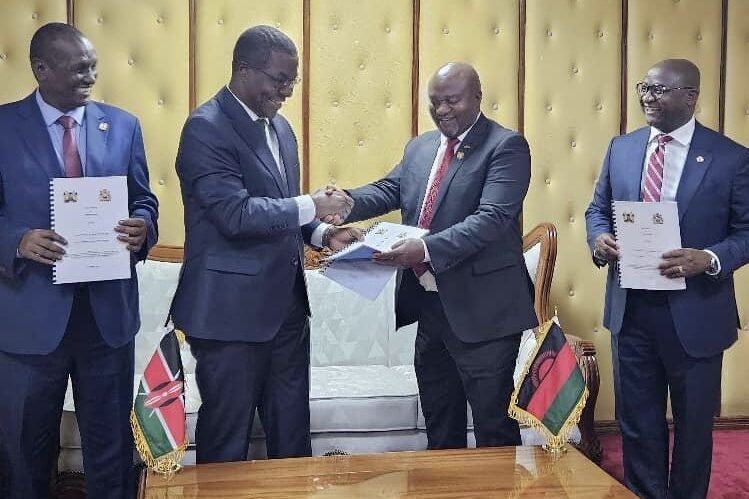Why Malawi energy minister is in Kenya

Kenya has signed a Memorandum of Understanding (MoU) with Malawi to share ideas on its ongoing government-to-government oil importation scheme.
The MoU was signed in Nairobi on Tuesday between Energy and Petroleum Cabinet Secretary Opiyo Wandayi with his Malawian counterpart Ibrahim Matola.
This comes just weeks after Matola also visited Kenya with a delegation from Malawi to benchmark on Kenya’s fuel importation arrangement which was introduced last year.
The government of Kenya today signed an MoU with Malawi to collaborate on the development of the petroleum sector and facilitate the importation of bulk refined petroleum products under a government-to-government arrangement
ministry of energy and petroleum
Kenya introduced the G-to-G model for fuel importation in March 2023 to address a shortage of US dollars in the market.
Previously, Kenya was importing fuel through the Open Tender System (OTS) which was open to all qualified oil marketing companies to bid for importation of petrol, diesel and kerosene cargoes.
Oil marketing companies spend an estimated $500 million to import fuel monthly.
It was however observed that this frequent rush for dollars in the market to pay for fuel had caused a distortion, significantly contributing to a rapid weakening of the Kenyan shilling.
Further, firms looking for dollars such as importers of other commodities, banks, manufacturers and even State-owned companies such as Kenya Power were struggling to access dollars to settle their bills.
Under the G-to-G arrangement, the government buys fuel on a credit period of six months from Saudi Aramco, Abu Dhabi National Oil Company (ADNOC) and Emirates National Oil Company (ENOC).
The introduction of this model has been cited as one of the reasons why the Kenyan shilling has rapidly strengthened this year as the deal eliminated speculation of dollars in the market.
It is for this reason that Malawi is also seeking to introduce a similar model to import fuel.
Malawi is currently undergoing a biting shortage of dollars that has left the Southern Africa country struggling to import essential products such as food and medicine.
the energy review
Kenya is set to end the use of the G-to-G model for fuel importation on December 31, 2023. This means that after that, oil companies will resume competitive bidding for importation of the commodity through the OTS.
Despite some of the successes of the G-to-G model, it has come under scrutiny for its opaqueness. The government has kept many of the details of the deal secret.
Further, it has emerged that Kenyans are paying up to Ksh2.7 more per liter in additional cost on fuel due to the model compared to the actual market price of the product.
info@theenergyreview.com
Discover more from THE ENERGY REVIEW
Subscribe to get the latest posts sent to your email.

